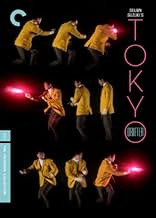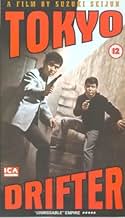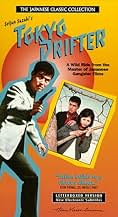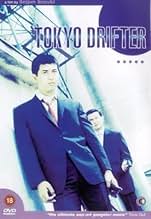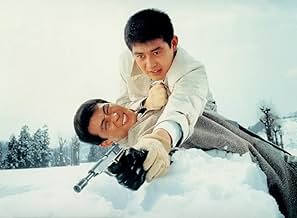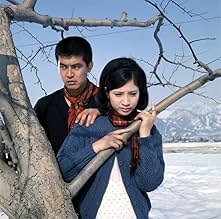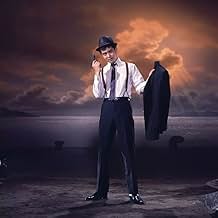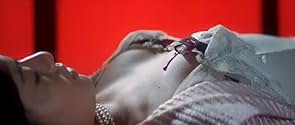After his gang disbands, a yakuza enforcer looks forward to life outside of organized crime but soon must become a drifter after his old rivals attempt to assassinate him.After his gang disbands, a yakuza enforcer looks forward to life outside of organized crime but soon must become a drifter after his old rivals attempt to assassinate him.After his gang disbands, a yakuza enforcer looks forward to life outside of organized crime but soon must become a drifter after his old rivals attempt to assassinate him.
Featured reviews
In my opinion, Tokyo Drifter is worth seeing, but comparing it to Branded to Kill is a bit like comparing apples and oranges.
Branded to Kill is eerie and nightmarishly weird--unforgettably, perhaps like a Hitchcock film or a dark film noire. Tokyo Drifter, on the other hand, is more "romantic." It is fun and chock full of mod 60s fashions and go-gos.
Both films are masterpieces of style. To me, Tokyo Drifter is worth seeing, but it has some silly moments. Somehow, I was left thinking of Woody Allen's What's Up Tiger Lilly and James Bond!
Branded to Kill is eerie and nightmarishly weird--unforgettably, perhaps like a Hitchcock film or a dark film noire. Tokyo Drifter, on the other hand, is more "romantic." It is fun and chock full of mod 60s fashions and go-gos.
Both films are masterpieces of style. To me, Tokyo Drifter is worth seeing, but it has some silly moments. Somehow, I was left thinking of Woody Allen's What's Up Tiger Lilly and James Bond!
Having previously seen Branded to Kill on its Criterion release, and having found it to be utterly brilliant, I had to buy the Criterion release of Tokyo Drifter. It is not as good as Branded to Kill (heck, nothing can be), but it is still great. The color composition is particularly masterful. So what if the story is difficult to follow? It is still entertaining. I really wish more of Sezuki Seijun's films would be released by Criterion, or anyone else, for that matter. He's an extraordinarily interesting and gifted filmmaker who is very underappreciated in cinema history.
I will argue until my death that TOKYO DRIFTER is superior to BRANDED TO KILL, but that's for another time...
I am amazed every time I see this film that Suzuki could take such an obviously inferior product -- as Nikkatsu Studios was churning out at an obscene rate in those days, giving directors a script and saying "Shoot it fast and cheap so we can give you your next job" -- and turn it into one of the most beautiful and intriguing films I've ever seen.
Best plot ever? No. Easy to follow? Yes. Beautiful? Yes. And that theme...I could never forget that theme if I tried, even after my first viewing.
I'd ramble on about history and plot and so on, but so many others have, I'll just leave it at this: TOKYO DRIFTER makes me happy every time I see it.
I am amazed every time I see this film that Suzuki could take such an obviously inferior product -- as Nikkatsu Studios was churning out at an obscene rate in those days, giving directors a script and saying "Shoot it fast and cheap so we can give you your next job" -- and turn it into one of the most beautiful and intriguing films I've ever seen.
Best plot ever? No. Easy to follow? Yes. Beautiful? Yes. And that theme...I could never forget that theme if I tried, even after my first viewing.
I'd ramble on about history and plot and so on, but so many others have, I'll just leave it at this: TOKYO DRIFTER makes me happy every time I see it.
Sensible logic might be little, but director Suzuki Seijun's surrealistic pop-art gangster feature "Tokyo Drifter" is a tour-de-fore in flamboyant, and unusual film-making. Everything about this fashionably unhinged effort reeks of ultra-coolness, with its edgy but trendy stylish guidance painting an influential pathway for many film-makers to experiment, but also providing familiar staples of noir and western inspirations to its own brash, creative juices. I admit the busily dry story is quite an unbalanced muddle, with fractured editing, but still for that time glamorously unconventional and erratically bewildering. The focus of the material is that of devotion (of business and love), but some quirky sight gags and mayhem make there way in. Mainly it's all about the majestic set-pieces though, and the delirious appeal of them are a wondrously enchanting sight. A trippy colour scheme infuses itself on the psychedelically warped set-designs of moody composition lighting, and the sudden bursts of exaggerated violence have a poetically tough awe surrounding it. The taut pace of the film stays pretty much on cruise control, but where the energy feeds off can be linked to Kaburagi So's fierily dramatic jazz musical score, and Mine Shigeyoshi's intimately snappy cinematography positioning. Even breaking up the murky narrative are odd song choices and a rhythmic theme. The colourful performances are dashing, and life-like with a brooding array of interesting characters. Testsuya Watari, HidekaI Nitani, Ryuji Kita, Chieko Matsubara and Eiji Go are enjoyably tailored to their parts. Highly stylised fun.
If you are fed up by ordinary manufactured campiness, but still have normal levels of humor.. Which is to say if you find Austin Powers not only boring but trivial, you might check this out. It is high camp. It is ridiculous in ways that in other action films we readily accept: think the recent James Bonds. There is a joke product placement — for hair driers — that is really funny.
We have the ordinary sort of thing that qualifies: cheesy songs, goofy hero, posed action, jingly hipness. But we have a level of cheesiness that goes beyond the Tarrantino level, beyond the usual joke. The cinematography is one big joke, one that still works today because the big movies still use Vietnam era visual devices.
We have jokes on Bertralucci, Welles, Kurosawa. Leone of course. We have a couple stagings from Bergman even. It is not worth the effort to single out any Frenchman it seems, treating them with the contempt of wholesale dismissal.
Under ordinary circumstances, I would not recommend this because the usual level of the joke gets pretty tiring after 20-30 minutes. But the cinematic jokes and references keep coming, as though there were a catalogue (like we are told the Coen brothers keep). The blatant vacancy of the visuals is pretty damning.
Ted's Evaluation -- 2 of 3: Has some interesting elements.
We have the ordinary sort of thing that qualifies: cheesy songs, goofy hero, posed action, jingly hipness. But we have a level of cheesiness that goes beyond the Tarrantino level, beyond the usual joke. The cinematography is one big joke, one that still works today because the big movies still use Vietnam era visual devices.
We have jokes on Bertralucci, Welles, Kurosawa. Leone of course. We have a couple stagings from Bergman even. It is not worth the effort to single out any Frenchman it seems, treating them with the contempt of wholesale dismissal.
Under ordinary circumstances, I would not recommend this because the usual level of the joke gets pretty tiring after 20-30 minutes. But the cinematic jokes and references keep coming, as though there were a catalogue (like we are told the Coen brothers keep). The blatant vacancy of the visuals is pretty damning.
Ted's Evaluation -- 2 of 3: Has some interesting elements.
Did you know
- TriviaWas shot and edited in 28 days.
- Quotes
Tetsuya 'Phoenix Tetsu' Hondo: A drifter needs no woman.
- ConnectionsFeatured in Seijun Suzuki | TCM (2013)
- How long is Tokyo Drifter?Powered by Alexa
Details
- Release date
- Country of origin
- Languages
- Also known as
- Abrechnung in Tokio
- Filming locations
- Production company
- See more company credits at IMDbPro
Box office
- Gross worldwide
- $755
- Runtime
- 1h 22m(82 min)
- Color
- Sound mix
- Aspect ratio
- 2.35 : 1
Contribute to this page
Suggest an edit or add missing content

